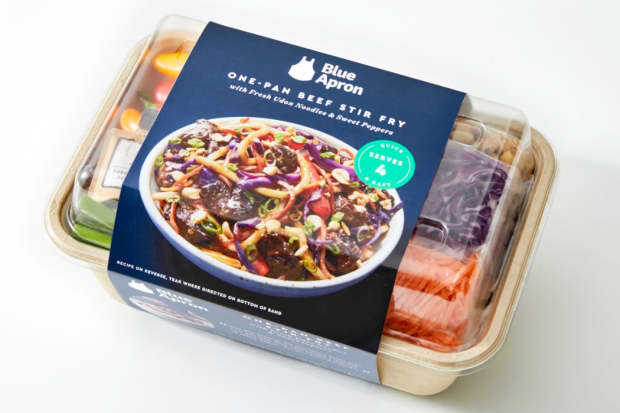Blue Apron to Sell Meal Kits in Stores to Buttress Sagging Deliveries

Blue Apron Holdings Inc. APRN 0.93% will try to give its struggling business a boost by selling meal kits in stores, acknowledging that its subscription-only model isn’t enough in an intensifying fight to fill people’s dinner plates.
One of the first meal-kit companies, Blue Apron has been losing customers amid increased competition and distribution problems. The company reported 750,000 subscribers last month, down from a peak of over 1 million last year. Its shares, down 46% so far this year, are trading around a fifth of their debut price of $10 last July. HelloFresh HFG +4.32% SE, the only other publicly traded meal-kit company, is up around 5% this year.
Independent surveys have shown that some consumers are turned off by the expense and commitment of meal-kit subscriptions. Blue Apron Chief Executive Brad Dickerson said he believes the company can find more customers for both that model and à-la-carte meals sold in stores and through its website.
“The access to consumers is much broader in this avenue than the avenue we’ve been operating in in the past,” he said in an interview.
Executives wouldn’t say how much Blue Apron will charge for the kits it hopes to have in stores by the end of this year. Blue Apron’s subscription meals start around $9 per person.
Blue Apron officials declined to specify the retailers they are in talks with but said some currently sell their own meal kits.
“We are in active conversations with a variety of retailers and plan to have product in stores in 2018,” a company spokeswoman said.
Shares of the New York-based company were up nearly 10% in the wake of the expansion news Thursday, before closing up 1.4% at $2.19.
Blue Apron, which began business in 2012, has cut expenses and improved profit margins since Mr. Dickerson replaced co-founder Matt Salzberg as CEO last fall. Mr. Dickerson said improvements at a production facility in New Jersey and elsewhere will help Blue Apron make and distribute more types of meals to homes and now stores.
But competition in meal kits is growing online and in stores as food makers seek new customers interested in fresh products and convenience.
Walmart Inc. and Kroger Co. also are selling their own branded meal kits, whileAmazon.com Inc. offers on-demand boxes online. Other big food companies are introducing prepackaged fresh foods to tap the fastest-growing segment of grocery-store sales.
Walmart said last week it wants to sell its meal kits in 2,000 stores this year. Weight Watchers International Inc. also said last week it will sell more of its branded meal boxes at supermarkets.

Fresh food sales at retailers grew 1.2% last year, according to Nielsen, while sales of the packaged and canned products that fill shelves in the center of many stores were flat. Sales of meal kits at grocery stores grew 27% last year to nearly $155 million, Nielsen said.
Most meal-kit customers still subscribe to a delivery service rather than buy them at stores. Dozens of companies have cropped up, marketing meals to customers who want vegan or low-calorie fare. Investors expect many to close or merge.
Blue Apron’s move into supermarkets could appeal to smaller grocers that don’t want to create their own branded meal kits, said Bob Goldin, co-founder of the Pentallect Inc. food consultancy. But selling Blue Apron outside of high-end stores could dent the company’s premium-brand image, he said.
“You need to be selective on who you target,” Mr. Goldin said.
Mr. Dickerson said the quality of a Blue Apron meal would speak for itself, no matter where the kit is sold. “Of course we’d say our food is better,” he said. “We’ve been doing this longer than anyone else has. That means a lot to the consumer.”
Write to Heather Haddon at heather.haddon@wsj.com

